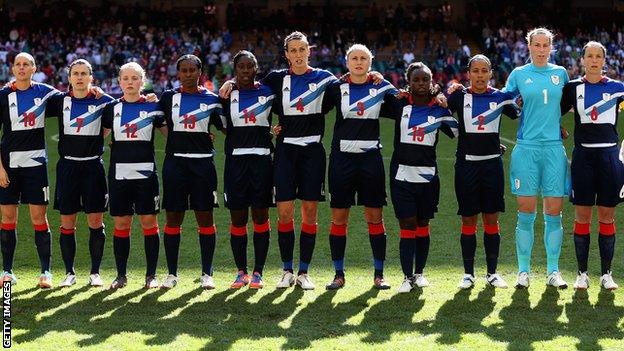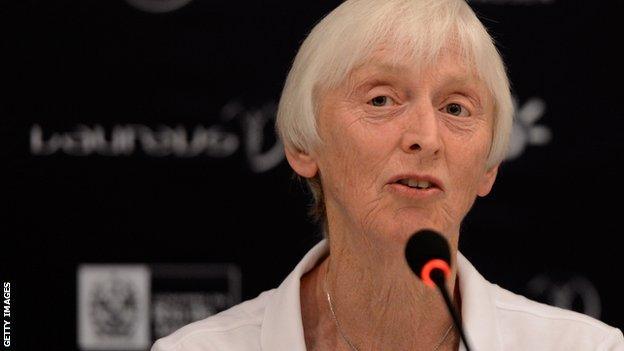Tokyo 2020: FA 'confident' of fielding Team GB side at Olympics
- Published

Captained by Casey Stoney, Team GB's women's football team reached the quarter-finals at the London 2012 Olympics
The Football Association is "confident" there will be a women's football side representing Team GB at the Tokyo 2020 Olympics.
The head of women's football, Baroness Sue Campbell, told BBC Sport the other home nations were "really supportive".
However, BBC Sport understands the Scottish FA would be against having Scots in a GB team, but would not stand in the way of a squad of English women.
The Irish FA refused to comment while the Welsh FA has yet to respond.
Team GB reached the quarter-finals at London 2012 but did not enter a team for the Rio 2016 Games because the four home nation football associations could not reach an agreement.
There were concerns that a united British team could risk a country's independence within Fifa - world football's governing body - with the home nations agreeing to co-operate for London 2012 on the basis it was a one-off.
"We've worked with the home countries and they are really supportive, as long as their individual players get the opportunity to be part of Team GB," Campbell said.
"We're going to make sure that through selection and the way we scout, we'll look across the whole of Great Britain and we'll give every player with an aspiration to play for Team GB the chance to do so."
European Championship bid

Campbell was appointed as head of women's football at the FA in January 2016
The FA announced in August it would bid to host the 2021 European Women's Championship.
Campbell revealed England were one of three teams vying to hold the tournament, alongside Austria and Hungary.
England reached the semi-finals of the 2017 European Championships, which took place in the Netherlands.
Then under the management of Mark Sampson, the Lionesses were favourites to win the tournament but lost 3-0 to the hosts.
"We'll put the bid in in the summer, and we'll know our fate by December," Campbell said.
"We're working with UK Sport, who have attracted major events in a whole range of sports including World Championships. They have massive experience so that will help us."
England last held the tournament in 2005, finishing bottom of their group as Germany went on to win the final.
But the Lionesses went on to reach the final four years later in Finland, when Germany claimed their fifth consecutive European title.
"We've put out a tender to cities, and they are really excited. They're putting in their written bids now," Campbell added.
"We'll select those cities not just on the basis of their facilities, but also on their legacy plan."
Growing viewing figures
Meanwhile, the FA has confirmed it is "on track" to double the number of players and fans in women's football by 2020.
The FA launched 'The Gameplan for Growth' - a four-year strategy - in March 2017.
In the first year of the project, peak viewing figures for live FA Women's Super League games increased from 46,000 to 103,000 on BT Sport, and to 130,000 on the BBC Red Button.
However, attendances at WSL 1 games are down by 11%, which Campbell put down to the switch to a winter league.
Attendances at WSL 2 games increased by 7%.
"We're only halfway through the season so we can't assess yet what the percentage drop overall is going to be," she said.
"Going back to a winter league and the bitter cold weather we've had has definitely had some impact, I don't doubt that."